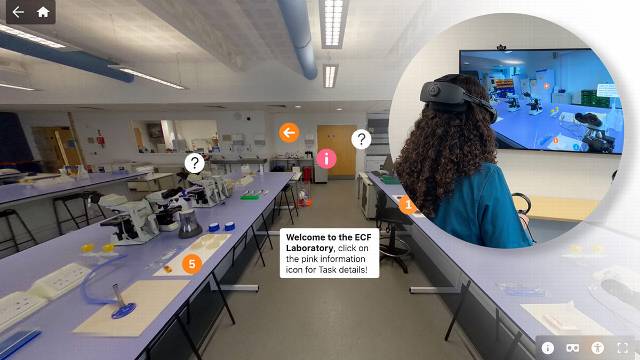
As we head towards the final term for the academic year, finalist students are working hard to complete the biggest project of their undergraduate degrees - their Honors Research Projects. The demanding year long piece is a great opportunity for students to explore the most enjoyable aspect of their studies and provide them with a range of skills to support them as they head into the working world. Jamie Jay, a final year BSc (Hons) Rural Enterprise and Land Management student, is completing his study and spoke to us about his research and how he hopes it will inform his work going forward.
Jamie spoke about his work and shared his inspiration, saying: “I am investigating the impact of heather beetle on red grouse production, an economically important game bird in the UK.
“After working at JM Osborne & Co, a sporting land agency firm for my 12 month placement year, I noticed that some of the estates we managed were being affected significantly by a very small insect. Hundreds of acres of internationally important heather moorland habitat was being damaged or killed. I wanted to know the reasoning behind this so focused my final year research project on the subject.
“I am investigating the perceptions of how heather beetle effects red grouse production in the UK and comparing the management techniques and their effectiveness based on relevant stakeholders. Finally, the study will estimate the economic impact of heather beetle on rural estates.”
Aware that not everyone would know about heather or its namesake beetle, Jamie shared the importance of this plant, commenting: “Heather moorland habitat is very important in the UK, hosting a wide variety of wildlife and biodiversity. Since 1991, heather moorland in Scotland alone has declined by almost 50%, due to overgrazing and afforestation.
“There are many factors that can affect the survival of heather moorland and it must be protected for future generations. Protection involves good management and without rural estates looking after this habitat for sporting purposes, it is hard to imagine where the money will come from to keep the UK’s upland habitats in good order. Therefore, I think it is important that more research is undertaken to understand the management of heather beetle to ensure the problem does not escalate and we do not lose even more of this fantastic habitat."
Having discovered this topic through his placement year, Jamie has worked with the network he established to discover more about the impact of heather beetle. He explained: “I chose this subject not only because it interested me, but to give something back to my placement employers who gave me an excellent year in industry. With their help I am able to contact several gamekeepers under their management that have been affected by heather beetle. This means that I will be able to contact gamekeepers from Northumberland, The Peak District, Yorkshire and Scotland which provides a widely distributed sample of data for this study.
“After completing my literature review, there is little research on these specific topics in the UK, therefore my data which will be recorded by interviews, should give rise to some very interesting findings.”
Jamie’s study has inspired him to continue his pursuit to sustain ecological sites of importance. Speaking about his future ambitions, Jamie shared that he would like to progress within the land agency industry and contribute to a more diverse and sustainable rural economy. He aims to do so by securing a graduate job that supports him through his Assessment of Professional Competence before going on to gain experience and further diversify his client base.
But how did Jamie decide a career in land agency was for him? He explained: “Growing up on a farm I had an interest in agriculture and the countryside from a young age. Sadly the farm was not ours and my family were involved in alternative careers, with my father working as a building surveyor. I combined my interest in agriculture with my knowledge of the surveying industry and decided to study Rural Enterprise and Land Management, with an ambition to train as a rural practice surveyor.
“Land agency is a wonderfully diverse career being able to take on a huge variety of work ranging from farm purchase, acquisition and selling, valuation, sporting management, agri-environmental management, residential or farm letting and farm diversification consultancy. You can work for one particular estate encompassing all these roles or work for a firm that has several clients and undertake these jobs depending on client instruction.”
With Jamie’s passion for his subject evident in his enthusiasm for what the future might hold, we asked for his advice to anyone looking into following a similar pathway. He said: “Definitely go for it! You do not need to be from a farming background or from the countryside, but of course experience in these areas will help. After working in agriculture and land agency I can confidently say that no one day is the same. You get to work in the best office - the countryside - and these careers are highly rewarding.
“The future of agriculture and the countryside is massively interesting at present and huge changes will occur in future years. If you want to make a difference and be involved in a fast moving, developing industry, REALM is a great starting place!”
Interested in finding out more about our land courses for yourself? You can see more on our course page or speak to a student about their REALM experience below.
Ask Me
 Blog: Veterinary Medicine students step into immersive 360° laboratory
At Harper & Keele Veterinary School, students are stepping beyond the traditional microbiology bench and into an immersive 360° labo …
Posted
Yesterday
Blog: Veterinary Medicine students step into immersive 360° laboratory
At Harper & Keele Veterinary School, students are stepping beyond the traditional microbiology bench and into an immersive 360° labo …
Posted
Yesterday





